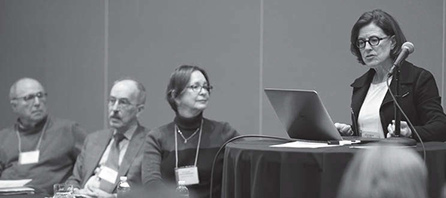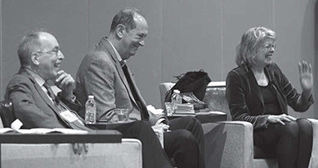
Photo: Jared Tennant
Space and Psyche Roundtable. Right to left: Elizabeth Danze, Hannah C. Wojciehowski, Peter L. Rudnytsky, and Robert H. Abzug. (Not in photo: Betty Sue Flowers)
APsaA IN AUSTIN
Elizabeth Danze and Peter L. Rudnytsky
Peter L. Rudnytsky, Ph.D., LCSW, is professor of English at the University of Florida and chair of the Committee on Psychoanalysis and the Academy.
Elizabeth Danze, M. Arch, a fellow of the American Institute of Architects, is a principal with Danze Blood Architects and professor of the University of Texas at Austin School of Architecture, where she is associate dean for graduate programs.

Photo: Jared Tennant
Space and Psyche Roundtable. Right to left: Elizabeth Danze, Hannah C. Wojciehowski, Peter L. Rudnytsky, and Robert H. Abzug. (Not in photo: Betty Sue Flowers)
We often hear calls for psychoanalysts to engage in outreach and bring the skills and sensibility honed in our consulting rooms to bear on the problems in our communities, the nation and the world at large. But in asking for more, we tend to lose sight of how much we are already doing, both as individuals and collectively as an organization. A case in point is the Committee on Psychoanalysis and the Academy, an outgrowth of the 10,000 Minds Project launched by Prudence Gourguechon during her term as president of APsaA from 2008 to 2010.
Counting among its members such eminent scholars and clinicians as Robert A. Paul, George Makari, Britt-Marie Schiller, Vera J. Camden, Nancy J. Chodorow, Diane O’Donoghue, Henry Schwartz, Madelon Sprengnether, Jeffrey Berman and our former co-chair Jeffrey Prager, the Academy Committee oversees three ongoing initiatives aimed at building bridges between the academic and clinical worlds of psychoanalysis. These are: the Courage to Dream book prize; Tuition Grants for Academics taking classes at APsaA institutes; and APsaA as an Allied Organization of the Modern Language Association of America (MLA), which guarantees us a session at the annual convention of the 26,000-member professional body of scholars and teachers of modern languages and literature in the United States.
Thanks to the tireless assistance of Debra Steinke Wardell, manager of Education and Membership Services, and with the enthusiastic support of Stephen Sonnenberg, founding head of the Education Department, in 2010 APsaA became an Allied Organization of MLA. Our first presenter, at the 2011 convention in Los Angeles, was Elyn R. Saks, and this year’s convention, held from January 6–9 in Austin, Texas, marked the sixth consecutive year in which members of the Academy Committee have staged exciting and successful events at the MLA.
SPACE AND PSYCHE
Knowing the convention would be taking place in Austin, committee member Elizabeth Danze volunteered to take charge of our guaranteed session. Her idea was to hold a roundtable titled “Space and Psyche,” moderated by Peter L. Rudnytsky, which featured, in addition to Danze, three other people with connections to the University of Texas: Robert H. Abzug, holder of the Rapoport Regents Chair of Jewish Studies, professor of English Hannah C. Wojciehowski, and Betty Sue Flowers, emerita professor of English and former director of the Lyndon Baines Johnson Presidential Library. As we do every year, we used the session to promote our other two initiatives, the book prize and tuition support program, to the 50 or so people in attendance.
Danze opened the roundtable by invoking Gaston Bachelard’s The Poetics of Space to highlight how our experience of buildings transcends the physical realm and extends into our deepest consciousness. Connecting Bachelard’s phenomenology of architecture with spaces intended specifically for psychotherapy, Danze captivated the audience by showing images of analysts’ offices from Sebastian Zimmerman’s book of photographs, Fifty Shrinks. “The transformation that occurs through psychotherapeutic work is as charged as the site where this exchange occurs,” she argued. “No other type of architectural space performs its function in quite the same way.”
In “Jolly Corners: Dream and Fictive Spaces of Henry James,” Hannah C. Wojciehowski noted that James’s “The Jolly Corner” may have originated in an actual dream of its author about the Gallerie d’Apollon in the Louvre. Wojciehowski then connected this famous ghost story to current research on the neuroscience of sleep and dreaming. Acknowledging that J. Allan Hobson’s formalistic approach in Dream Consciousness may help us to ponder the function of movement in and through space within dreams, Wojciehowski nonetheless took issue with Hobson’s rejection of psychoanalysis: “Hobson helps us not at all, however, with understanding the content of dreams, for example, the mysterious ways space can be supercharged with meaning, partly through its resonance with the body and with the embodied meanings we invest in dreams and that we can extract through dream and fictional analysis.”
Previewing his forthcoming biography of existential psychoanalyst Rollo May, Robert Abzug, in “Reading Love and Will from Montreal,” shifted our attention to the transferential relationship that can arise between a reader and the author of a text. He instanced a letter written to May in 1973 by a 19-year-old Canadian woman, who told him that, while she appreciated the “philosophical and intellectual” content of his bestseller, Love and Will, she most of all wished to thank him for the “emotional experience” that reading it had provided. May’s young admirer poured out her feelings of angst, loneliness and desire to become an artist. At once ingenuous and sophisticated, she was, as Abzug demonstrated, paradoxically “wishing for May’s love and yet understanding the illusory nature of her entire discourse,” much as might happen with a patient in analysis.
CHANGING THE FUTURE
Betty Sue Flowers uses her expertise in fiction to work with governments, corporations and NGOs to create narratives about the future that seek to change what we do in the present. Again, the similarities to analytic work are apparent. In “The War on Drugs: Narrative, Space, and Transformation,” Flowers described how she assembled representatives from all parts of the drug trafficking system in the Western Hemisphere, including a Mexican general, the chief of police of Nicaragua, a former FARC guerrilla, an activist in the legalization movement, the head of a needle exchange program in Canada, and health care professionals. From this unscripted clash of perspectives there emerged four different future scenarios among which it began to be possible to choose thoughtfully. “ To solve tough problems,” Flowers concluded her case study in policy making, “we have to gather diverse people together to create a common ground for dialogue and transformation.”
Not only was the ensuing question and answer period with the audience lively and engaging, but people came up afterward to speak with the panelists. One faculty member from Portland was so inspired by the presentations she wanted to explore the possibility of taking classes at an analytic institute. We encouraged her to contact the Oregon Psychoanalytic Center and reminded her about the tuition support program.

Photo: Jared Tennant
Creative Conversation. Left to right: Peter L. Rudnytsky, Senator Bill Bradley and Kathleen Woodward.
Ordinarily, APsaA sponsors only one session at the MLA convention. The 2016 theme, however, was “Literature and Its Publics: Past, Present, and Future,” and it occurred to Rudnytsky to propose that MLA invite former New Jersey senator, 2000 presidential candidate, and New York Knicks basketball star Bill Bradley as a featured speaker. In a high-profile event called a Creative Conversation, Senator Bradley was interviewed by Kathleen Woodward, Lockwood Professor of the Humanities and professor of English at the University of Washington, where she directs the Simpson Center for the Humanities.
INTRODUCING BILL BRADLEY
In introducing Senator Bradley, whom he called “a true champion on and off the court,” Rudnytsky quoted from his most recent book, We Can All Do Better: “As human beings, we must see our interconnectedness and recognize that we are capable of great things when we cooperate with one another.… Only well-considered action will allow us to move beyond our current situation.” He then “passed the ball” to Woodward, who thoughtfully probed the senator on what actions we as Americans can take, both individually and collectively, to address the critical problems facing us in the world today. Senator Bradley said history, his major at Princeton, reveals “the human dimension to our affairs,” and went on to describe how he increasingly came to “enjoy the lyrical aspects of the game” of basketball, when he “was totally in sync” with his Knick teammates, Walt Frazier and Jerry Lucas. As a politician, when he would walk the 127 miles of the Jersey shore to meet his constituents, he, like a psychoanalyst, experienced firsthand how they would “project their fears, their hopes, their anger” onto him, and learned the value of stories as a way to “connect with people” and “how important they were to me, and I could tell them that.”
Since APsaA will be holding its Annual Meeting in June 2017 in Austin, we wanted to report on our efforts at “outreach” on behalf of psychoanalysis and recommend that others discover the pleasures of the “Live Music Capital of the World” for themselves.